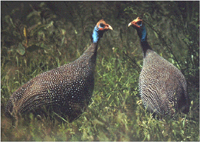Guinea Fowl There is just one type of guinea fowl (Numidia meleagris) available in the UK and these are used mainly for meat. Egg production is not particularly good at around 50 per year and dayold keets (youngsters) are only available at certain times. They can be treated as chickens in the rearing and feeding but they are able to fly once nearly adult, so wing clipping is essential or net them over. They do not take kindly to being kept indoors and will roost as high as possible, shouting at anything strange. They will get some of their food by foraging, but do like some layer pellets and wheat. Sexing guinea fowl is by call only: the female shouts “get back, get back” with two syllables and the male has a single syllable screech. The naked heads and pendant wattles can vary in size but this is not always linked to the sex of them. The colours are pearl (dark with small white spots), lavender (pale blue with small white spots) and then some others have varying areas of white or fawn.
Occasionally adults are available but what must be taken into account is that these are very, very noisy birds, so neighbours have to be considered. Coming originally from Africa, the shells of the eggs are very tough and hatching can sometimes be a problem. Incubation time is 28 days, but due to the strong shell, storage of 2-3 weeks does not seem to affect hatchability unduly. In a flock, they appear like a group of busybodies, shouting their disapproval at youths as they rush about with their skirts trailing getting into everyone’s business – entertaining but noisy. Other types of (wild) guinea fowl such as helmeted or vulturine are not domesticated although sometimes kept in captivity. |



